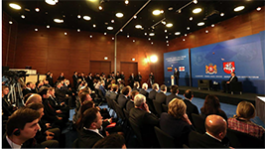Неэргодическая экономика
Авторский аналитический Интернет-журнал
Изучение широкого спектра проблем экономики
На английском языке
Mistakes made during the formation the public sector of Russia’s economy and the system of its regulation are discussed in the article. The authors show that the Russian executive bodies ignored positive foreign experience during the economic reforms and outline ways to normalize the situation.
17.08.2018
The existing system of personnel training in Russia is analyzed. The increasing tendency to fill the market with unskilled labor, the industrial syndrome in the training structure, and the gradual reduction of specialists trained for work in priority economic fields gives the authors of the article cause for anxiety.
16.08.2018
Developing and transition economy countries have two specific features: first, the capital deficit problem in these countries is particularly acute, and second, traditional capital redistribution channels either do not work or work poorly. In view of this, economic agents in these countries look for other options of investment market organization, using not very traditional methods for this purpose. One of these in Russia is the institution of regional investment forums.
13.08.2018
The article gives a formal and substantive interpretation of Adolph Wagner’s law. Empirical evidence of violation of this law is cited. The role of the Armey–Rahn curve in restraining Wagner’s law is revealed. The Armey–Rahn curve is identified for Sweden and Russia. The paradox of wealth is formulated and a substantive explanation of it is given.
08.08.2018
The article reports the results of testing of Wagner’s law for four countries: the United States, Great Britain, Sweden, and Russia. Econometric relation-ships are constructed that can be used to study properties of the Armey–Rahn curve and the Laffer curve. A new algorithm is suggested for finding the Laffer points and Scully points. The evolution of budget policy and the connection of budget parameters with the economic growth rate are examined.
06.08.2018
This article has presented a short–term macroeconomic indicator, the index of monetary efficiency, which is an aggregate of two subindices, i.e., monetary stability and monetary freedom. An econometric model has been constructed, in which the GDP depends on the index of monetary efficiency with a lag of 8 months, which allows for the proactive prediction of economic growth. All analytical tools have been evaluated based on the statistical data of the Bank of Russia with a monthly breakdown.
31.07.2018
The article reveals the experience of a project on consolidation of rating products within the single portal with related services for users. We describe the ideology of an open Internet platform, its structure and navigation, and specially designed analytical tools. We focus on the developed and tested trust index in relation to all the ratings on the website, which helps approach a possible solution to the problem of rating verification. We point out the fact that the proposed analytical verification tools are vulnerable to manipulation that is manifested in users’ hostile attacks on selective ratings by giving the ratings deliberately low trust scores. The paper shows the relevance of the portal designed, which is manifested not only in the number of views of its content, but also in the public reaction to various ratings of both individuals and organizations. In addition, we disclose the experience of using academic ratings over the period of several years to reveal undesirable trends and emerging threats in the market of economic research. We show an attempt to combine different ratings for the purpose of determining the extent of using educational and scientific potential of Russian regions. Video interviews allowed us to formulate ten principles in the development and use of ratings: neutrality (disinterest of the developer as a participant); pluralism (diversity of ratings); duration of the period of preparation; improvement of development methodology; openness of the object of rating and ranker; selectivity (optionality) of application, etc. These principles help raise the work of rankers to a higher level. We outline the ways of using the portal for communication between rankers and the expert community, for establishing a constructive dialogue between them and improving rating tools.
29.05.2018
The article considers a possibility of change of the current global world economic leader – the United States. The author introduces the concept “geopolitical inversion”, which means the change of the global economic center. The article describes a common globalizing trend in the formation of the world centers of capital, provides quantitative characteristics of this process – the indices of territorial and demographic dominance. The article uses the example of the UK and the USA to show five steps in geopolitical inversion and give their chronology. The author makes some suggestions concerning a new global leader that could succeed the USA.
25.02.2018
This article examines the concept of inclusive institutions (CII) put forward by Daron Acemoglu and James Robinson. It draws analogies and parallels between the CII and earlier economic theories and doctrines, revealing their organic interconnection and continuity. Particular focus is put on a more precise definition of inclusive and extractive institutions made possible by the introduction of the concepts of guarantees and freedoms of two social groups, the elites and the masses. The author shows that many systemic crises do not lend themselves to an adequate explanation without these clarifications.
29.08.2017
The article surveys the ideas that constitute the basis of contemporary trap theory. Theoretical diagrams and constructs are presented as well as empirical facts that reveal how institutional and technological traps originate and function. Ways in which systems get out of traps are considered, and the significance of the new theory for understanding not only global but also everyday events in economics is discussed.
13.06.2015












